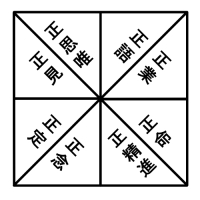 May all beings have happiness and the causes of happiness.
May all beings have happiness and the causes of happiness.
May they be free of suffering and the causes of suffering.
May they never be separated from supreme joy beyond all sorrow.
May they abide in equanimity free from attachment and aversion.
— Buddhist Prayer
I’m currently watching a beautiful anime called “The Heike Story”, based on the Japanese Tale of the Heike. The central character is a child plagued with the ability to see visions (usually of death and destruction) of the future and remote events. She is anguished to witness these and is powerless to do anything about them, but finally (spoilers!) determines that she might ease her mind by praying for those involved.
This character is not portrayed as any sort of religious individual, so I wondered what kind of prayer might be appropriate for her. Searching for an “Atheist Prayer”, I quickly found the Buddhist Prayer above that might be something like she would say, that encodes the “Four Immeasurables” of Buddhist thought. This prayer is not offered to any god or gods, but just a wish and hope for those in mind and indeed for all sentient beings.
The Four Immeasurables of Buddhism are
- Maitri: Loving kindness
- Karuna: Compassion
- Mudita: Sympathetic Joy
- Upeksha: Equanimity
Further Reading:
https://iai.tv/articles/prayer-for-atheists-auid-1181
The Four Immeasurables
The Four Immeasurables
https://www.google.com/search?q=four+immeasurables&tbm=isch
https://en.wikipedia.org/wiki/The_Heike_Story
[*13.16]
 Hakuin Ekaku: Four Ways of Knowing:
Hakuin Ekaku: Four Ways of Knowing:






